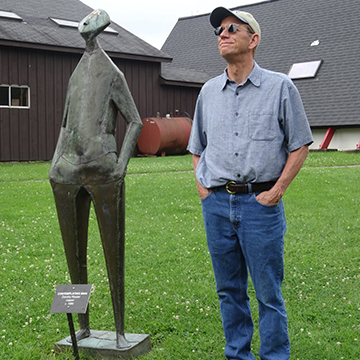
Paul Dawson
Biography
Professor Dawson attended Montana State University, receiving a Bachelor of Science degree in Mechanical Engineering in 1972, and Colorado State University, receiving Master of Science and Doctor of Philosophy degrees in Civil Engineering in 1974 and 1976, respectively. Prior to his graduate studies, Professor Dawson worked for one year as an Associate Engineer at the Advanced Reactors Division of Westinghouse. Following his graduate students, he worked for three years as a Member of the Technical Staff in the Computational Physics and Mechanics Division of Sandia National Laboratories. Professor Dawson joined the Cornell faculty in 1979 as an Assistant Professor in the Sibley School of Mechanical and Aerospace Engineering. He was promoted to Associate Professor in 1984 and to Professor in 1990. He has enjoyed sabbatical leaves at the Center for Materials Science, Los Alamos National Laboratory, in 1985-86, the University of California, Berkeley, in 2008 and the University of British Columbia in 2009. He is active in research at the interface of solid mechanics and materials science computational mechanical, with emphasis on computational mechanics applied to problems in mechanics of materials. He teaches courses related to stress analysis, metal forming, vehicle mechanics, solid mechanics and finite element methods.
Research Interests
Dr. Dawson's primary area of research is the mechanics and materials science associated with deformation processes of polycrystalline materials. The general aim of the research is to integrate modern constitutive theories for the mechanical behavior of these materials into rigorous mechanics frameworks and to solve the resulting systems of equations by numerical techniques. The end goal is a more fundamental understanding of the relation between a material's microstructure state and its derivative mechanical properties. Recent efforts include the application of state-variable constitutive models that quantify strain hardening, texture evolution, and damage growth into finite element based numerical formulations. Application areas include metal forming, solid-state welding, fatigue and accelerated property evaluation. Special attention is given to the coordination of in situ diffraction experiments and finite element simulations to investigate modeling of behavior at the scale of individual crystals.
Teaching Interests
Solid mechanics, including introductory stress analysis at the undergraduate level, foundations of solid mechanics at the graduate level, and finite element analyses. Applications courses include mechanics of vehicles, mechanics of large deformations, nonlinear finite element methods applied to plasticity, and micromechanics of crystalline materials.
Selected Publications
- A. C. Poshadel, and P. R. Dawson. 2019. “Role of anisotropic strength and stiffness in governing the initiation and propagation of yielding in polycrystalline solids.” Metallurgical and Materials Transactions A, 50(3):1185–1201.
- K. Chatterjee, M.P. Echlin, M. P. Kasemer, P. G. Callahan, T. M. Pollock, and P. R. Dawson. Sept 2018. “Prediction of tensile stiffness and strength of Ti-6Al-4V using instantiated volume elements and crystal plasticity.” Acta Materialia, 157:21–32.
- J.-S. Park, K. Yildilzi, E. Demir, P. R. Dawson, and M. P. Miller. 2018. “Non-destructive characterization of subsurface residual stress fields and correlation with microstructural conditions in a shot-peened inconel component.” Experimental Mechanics, 58:1389–1406.
- P. R. Dawson, D. E. Boyce, J.-S. Park, E. Wielewski, and M. P. Miller. June 2018. “Determining the strengths of hcp slip systems using harmonic analyses of lattice strain distributions.” Acta Materialia, 144:92–106.
- M. Kasemer, R. Quey, and P. R. Dawson. 2017. “The influence of mechanical constraints introduced by β annealed microstructures on the yield strength and ductility of Ti-6Al-4V.” Journal of the Mechanics and Physics of Solids, 103:179–198.
Selected Awards and Honors
- Joseph Ford Professor of Engineering (Cornell University) 2013
- Weinberg Lecturer (University of British Columbia) 2004
- Tau Beta Pi Award for Excellence in Teaching (Cornell University) 2002
- Young Manufacturing Engineer Award (SME) 1985
- Presidential Young Investigator Award (National Science Foundation) 1984
Education
- B.S. (Mechanical and Aerospace Engineering), Montana State University, 1972
- M.S. (Civil Engineering), Colorado State University, 1974
- Ph.D. (Civil Engineering), Colorado State University, 1976


